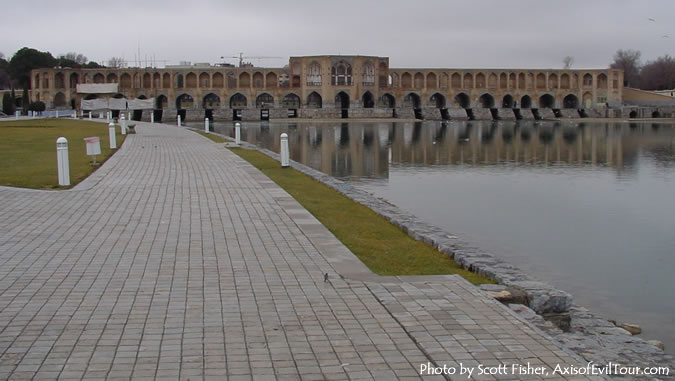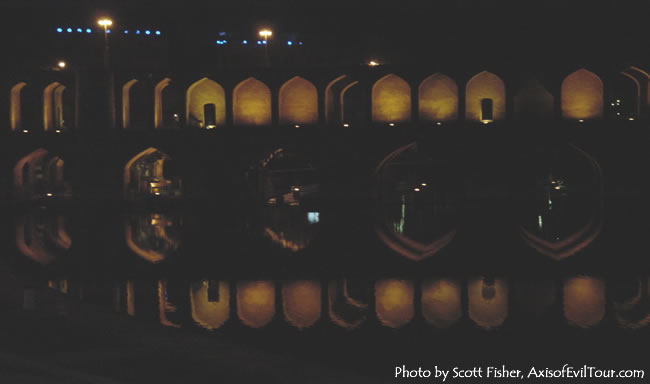Central Iran – Arrival in Esfahan
(DAY 12) Newspapers, websites, TV news – it seemed that every one of them had run a feature on Iran’s rejuvenated nuclear program in the days leading up to this part of my trip. In nearly every story Esfahan was listed as the major city closest to the program’s home. There were so many stories it actually felt like driving into a spotlight, like being back in Baghdad, knowing you were at the center of world attention.
Esfahan was the first large city we’d been in since Tehran. After all of the emptiness and countryside it felt cramped and confusing. I could tell it bothered Professor too – he was more at home in the country or around the tourist sites than driving in big city traffic.
Searching for our downtown hotel took forever in Esfahan’s confusing maze of one-way streets and wall-to-wall cars. We had to stop and ask for directions a half dozen times, though by now I could roll down the window and ask for directions myself. Seeing the surprised looks on people’s faces when a foreigner asked for directions, let alone in Farsi, got Professor and I laughing and helped break the tediousness of the search.

Traditional Bridge over Esfahan’s Zayandeh River
The best thing about the hotel, other than finally finding it, was the easy walk to the riverfront. Esfahan is broken into roughly two halves by the Zayandeh River, with our hotel on the traditional, Islamic side. The far side contained a newer area of Armenian Christians, similar to the Jewish area of Hamedan and the Zoroastrian area of Yazd. A walk along the green, landscaped waterfront, though chilly in the winds of January, was a great change from the endless brown of the preceding days. Plus the river was spanned in several places by traditional bridges intricately assembled from carved stone. At the base of several of the bridges were tea shops offering great views of the river and a chance to relax with a pipe of Iran’s finest.
Before setting out for a walk along the river we had to meet our local guide. The tour guide union of Iran (yeah, seriously) is quite strong in heavily-touristed areas like Esfahan and requires tourists to hire a local guide in addition to their main guide. People like Professor are licensed to lead tours around the country, but in certain restricted areas licenses only go to locals – meaning any tour groups in the area require a local rep.
At this point I’d spent so much time with Professor he was becoming Iran in my mind – meeting someone new actually sounded like a good idea. I asked Professor to request a young woman, which got a laugh, but in the end the guide turned out to be an Esfahani grandfather and semi-retired schoolteacher. That first meeting was a chance to get to know each other, plus schedule the places we’d visit over the next couple of days. Tomorrow would be the riverfront and Armenian Quarter, the next day Esfahan’s impressive central square and the world-famous mosques of the old city.
After meeting, “the local,” as Professor took to calling him, we checked out the waterfront and grabbed a quick dinner before parting ways. He to his room, me on my latest search for an Internet card.
There was a nice mall about a block down from the hotel that was perfect for wandering around and people-watching. As the nicest mall in Iran’s richest city the crowds were the most upscale I’d seen since north Tehran. People showed this wealth in unique ways – instead of nice outfits, for example, women spent their money on designer shoes and expensive silks for their headscarves.
I walked around taking in the sights until coming to a computer shop selling Internet cards. It was exactly like any other computer store in the world – a couple of young, unwashed geeks sitting behind the counter playing computer games. Upon seeing a foreigner they exchanged odd looks and hit pause. Both of them! I felt honored. It seemed that in Iran, at least briefly, I was more interesting than a computer game.
Not knowing how long I could hold their attention, I quickly asked if they had any Internet cards. Hearing me hack away at their language startled them even more than my appearance. They pointed me toward the cards, asking where I was from at the same time.
“America.”
“America?!?!” They each said to the other, surprised looks on their faces. Then, switching to English, “Welcome! Welcome! You can speak Farsi?”
“No, not much. Do you speak English?”
“A little. I speak computer English!”
Fortunately, most computer words (‘Pentium’, ‘Internet’, ‘Windows’, etc.) are the same in most languages, so it wasn’t hard to hold a simple conversation. They first wanted to know when the new Windows was coming out, and then whether it’d be as buggy as the last new release (truly a matter of world-wide concern …). Then they asked about Apple and this new iPod thing they kept hearing so much about.
When we got into a discussion on computer games they pulled out some of the five billion software CDs they had for sale. All of course were pirated, though here with a color copy of the original cover, plus some info in Farsi. I mentioned a program I’d been looking for and we dug through their truly impressive array of games looking for it. While nowhere to be found, our search did produce the realization that economic sanctions mean exactly squat when it comes to software. They probably had a wider selection of programs and games than Amazon, and all for a couple of bucks.
As I wandered back up the street through the heart of Esfahan’s ‘see and be seen’ district, it was nice to realize that here too young people were managing to break through the barriers and get in touch with each other. The, by now normal, single-sex groups were on the prowl, slowly walking by each other and making the uber-subtle flirtations I was getting better at spotting.
After ten days in the sticks I was surprised to see women only wearing a small head scarf and simple jacket, instead of the full-on coverings of the desert. You could almost see ears and necks! The horror!

Night View of Esfahan Bridge